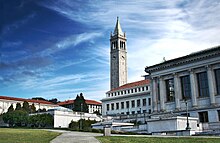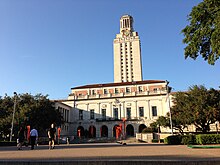Public Ivy

The Wren Building at the College of William & Mary

Sather Tower seen from Memorial Glade of the University of California, Berkeley

Harrison Hall at Miami University

Michigan Union at the University of Michigan

Wilson Library at the University of North Carolina at Chapel Hill

The Main Building at the University of Texas at Austin

Old Mill at the University of Vermont.
"Public Ivy" is a term coined by Richard Moll in his 1985 book Public Ivies: A Guide to America's Best Public Undergraduate Colleges and Universities to refer to U.S. universities that are claimed to provide an Ivy League collegiate experience at a public university price.[1] Public Ivies are considered, according to The Journal of Blacks in Higher Education, to be capable of "successfully competing with the Ivy League schools in academic rigor … attracting superstar faculty and in competing for the best and brightest students of all races."[2]
Contents
1 Origins of the term
2 Public Ivy list
2.1 Original Public Ivies
2.2 Worthy runners-up
3 Greenes' Guides
4 See also
5 References and other resources
5.1 Citations
5.2 Books
Origins of the term
Moll, who earned his Master of Divinity degree from Yale University in 1959,[3] was an admissions officer at Yale, and the director of admissions at Bowdoin College, University of California, Santa Cruz, and Vassar College.[3][4][5] He traveled the nation examining higher education, and identified eight public institutions (the same as the number of Ivy League members) that he thought had the look and feel of an Ivy League university. In addition to academic excellence, other factors considered by Moll include appearance, age, and school traditions, as well as certain other Ivy League characteristics.[6]
Public Ivy list
Original Public Ivies
The original Public Ivies as Moll listed them in 1985:[2]
College of William & Mary (Williamsburg, Virginia)
Miami University (Oxford, Ohio)
University of California (nine campuses as of 1985)[7]
University of Michigan (Ann Arbor)- University of North Carolina at Chapel Hill
- University of Texas at Austin
University of Vermont (Burlington)
University of Virginia (Charlottesville)
Worthy runners-up
Moll also offered in the same book "a list of worthy runners-up" and brief summaries of them:[8]
- University of Colorado Boulder
Georgia Institute of Technology (Atlanta)- University of Illinois at Urbana-Champaign
New College of the University of South Florida (Sarasota; now New College of Florida)- Pennsylvania State University at University Park
- University of Pittsburgh
State University of New York at Binghamton (now branded as Binghamton University)
University of Washington (Seattle)- University of Wisconsin–Madison
Greenes' Guides
A book titled The Public Ivies: America's Flagship Public Universities (2001) by Howard and Matthew Greene of Greenes' Guides included 30 colleges and universities.[9] The table below is organized by region, and colleges are listed in alphabetical order.

The Rotunda at the University of Virginia
|
|
See also
- Black Ivy League
- Colonial colleges
- Flagship university
- Hidden Ivies: Thirty Colleges of Excellence
- Little Three
- Little Ivies
- Seven Sisters
- Southern Ivies
References and other resources
Citations
^ Richard Moll in his book Public Ivys: A Guide to America's best public undergraduate colleges and universities (1985)
^ ab "Comparing Black Enrollments at the Public Ivies". The Journal of Blacks in Higher Education. Autumn 2005. Retrieved 2006-09-03..mw-parser-output cite.citation{font-style:inherit}.mw-parser-output q{quotes:"""""""'""'"}.mw-parser-output code.cs1-code{color:inherit;background:inherit;border:inherit;padding:inherit}.mw-parser-output .cs1-lock-free a{background:url("//upload.wikimedia.org/wikipedia/commons/thumb/6/65/Lock-green.svg/9px-Lock-green.svg.png")no-repeat;background-position:right .1em center}.mw-parser-output .cs1-lock-limited a,.mw-parser-output .cs1-lock-registration a{background:url("//upload.wikimedia.org/wikipedia/commons/thumb/d/d6/Lock-gray-alt-2.svg/9px-Lock-gray-alt-2.svg.png")no-repeat;background-position:right .1em center}.mw-parser-output .cs1-lock-subscription a{background:url("//upload.wikimedia.org/wikipedia/commons/thumb/a/aa/Lock-red-alt-2.svg/9px-Lock-red-alt-2.svg.png")no-repeat;background-position:right .1em center}.mw-parser-output .cs1-subscription,.mw-parser-output .cs1-registration{color:#555}.mw-parser-output .cs1-subscription span,.mw-parser-output .cs1-registration span{border-bottom:1px dotted;cursor:help}.mw-parser-output .cs1-hidden-error{display:none;font-size:100%}.mw-parser-output .cs1-visible-error{font-size:100%}.mw-parser-output .cs1-subscription,.mw-parser-output .cs1-registration,.mw-parser-output .cs1-format{font-size:95%}.mw-parser-output .cs1-kern-left,.mw-parser-output .cs1-kern-wl-left{padding-left:0.2em}.mw-parser-output .cs1-kern-right,.mw-parser-output .cs1-kern-wl-right{padding-right:0.2em}
^ ab Branch, Mark Alden (November 2000). "Deciphering the Admissions Map". Yale Alumni Magazine. 109 (11). Archived from the original on 2008-01-07. Retrieved 2008-02-09.¶16: But Richard Moll '59MDiv, a former Yale admissions officer who later oversaw admissions at Bowdoin and Vassar, thinks Yale still is not as visible as it should be. "Yale has not had the presence at grassroots admissions and counseling conferences that Harvard and Stanford have," says Moll, author of Playing the Selective College Admissions Game.
^ Pierce, Kenneth M. (24 November 1980). "Dr. Fix-It Goes to Santa Cruz". Time. Retrieved 2008-02-09.Trouble in paradise as "the touchy-feely school" sings the blues – Richard Moll, 45, a tweedy graduate of Yale's Divinity School, has become a Dr. Fix-It for colleges that complain of sagging enrollment.
^ Paul Marthers, Dean of Admission. "Admissions Messages vs. Admissions Realities". Office of Admissions. Reed College. Archived from the original on 2008-02-21. Retrieved 2008-02-09.
^ Savage, David G. (1985-10-06). "The Public Ivys: A Guide to America's Best Public Undergraduate Colleges and Universities". Los Angeles Times. ISSN 0458-3035. Retrieved 2016-07-26.
^ In Moll's book, he refers to the entire UC system
^ Moll, Richard (1985). The Public Ivys: A Guide to America's Best Undergraduate Colleges and Universities. Viking Penguin Inc., p. xxvi.
ISBN 0-670-58205-0
^ Greene, Howard R.; Greene, Matthew W. (2001). The public ivies: America's flagship public universities (1st ed.). New York: Cliff Street Books. ISBN 978-0060934590.
Books
Greene, Howard; Matthew Greene (2001). The Public Ivies: America's Flagship Public Universities. New York: HarperCollins. ISBN 0-06-093459-X.
Greene, Howard; Matthew Greene (2000). Hidden Ivies: Thirty Colleges of Excellence. New York: HarperCollins. ISBN 0-06-095362-4.
Moll, Richard (1985). The Public Ivies: A Guide to America's best public undergraduate colleges and universities. New York: Penguin (Viking). ISBN 0-14-009384-2.